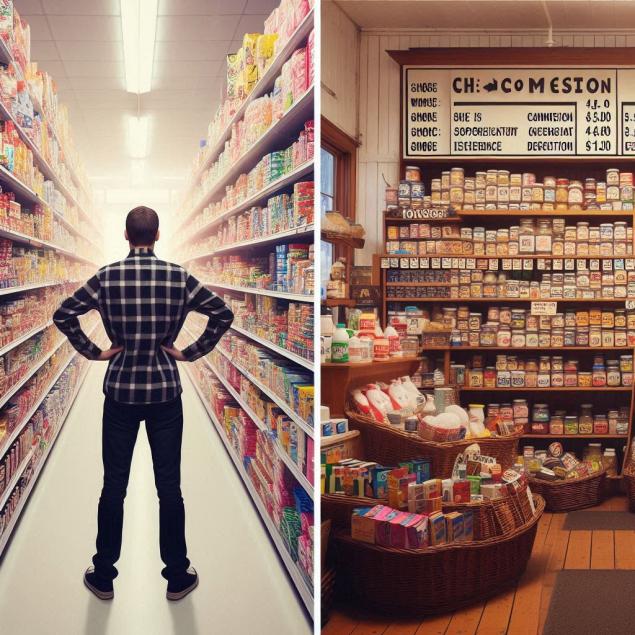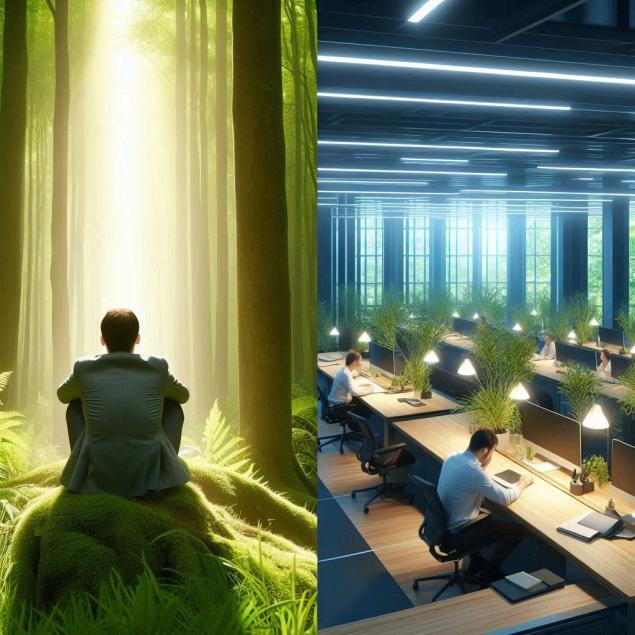228
Why technology and comfort don’t make us happy
It was definitely worse before, but harsh living conditions left no time for stress, apathy and depression.

We live in an era of unprecedented comfort, technological progress and material abundance, but the level of happiness not only does not increase proportionately, but even decreases in many developed countries. Depression, anxiety and emptiness have become the epidemic of our time. How is it that our great-grandparents, living in conditions that we would consider intolerable, often showed greater psychological stability and life satisfaction?
A technological paradise or a digital cell?
We are surrounded by devices designed to make our lives easier and more comfortable. Smartphones in our pockets contain more computing power than the computers that sent a man to the moon. Smart homes automate household tasks. Delivery of food eliminates the need to cook. Streaming services offer endless entertainment on demand.
But instead of getting rid of the routine, we got a new form of addiction. Research shows that the average user checks their phone 96 times a day — about every 10 minutes of waking time. The brain, which receives regular doses of dopamine from notifications, functions like an addiction mechanism, triggering digital anxiety: the fear of missing out on something important, constantly comparing oneself to others on social media.
The phenomenon of adaptation and hedonistic treadmill
Psychologists have long identified a mechanism for adaptive happiness: people quickly get used to improvements in living conditions, and a new, higher standard of comfort becomes the norm. This phenomenon is known as “hedonic adaptation” or “hedonic treadmill” – we constantly seek new sources of pleasure, but each achievement brings only temporary satisfaction.
People living in the most favorable circumstances are only slightly happier than their ancestors or people in less developed countries. Daniel Kahneman, Nobel Prize winner in economics
The Paradox of Choice: Too Much Good
The average person makes about 35,000 decisions every day, from clothing and breakfast to more serious career and relationship issues. Psychologist Barry Schwartz in his book “The Paradox of Choice” proved that the excess of options does not make us happier, but on the contrary, often leads to paralysis of decisions, increased anxiety and regret about the choices made.

Our ancestors had far fewer options and, as a result, less cognitive load. In traditional societies, many life decisions were predetermined by tradition, family, or circumstances. Lack of choice may seem like a limitation, but it also relieved constant doubt and a sense of missed opportunities.
Loss of physical labor and connection with the results of their activities
Automation and digitalization have deprived many of us of an important psychological resource: satisfaction from physical labor and visible results of their work. An office worker can spend the whole day at a computer without a tangible result. In contrast, the farmer or artisan of the past saw a direct link between his efforts and the result.
Anthropologist James Suzman, who studied the Bushmen tribe in the Kalahari Desert, notes that members of this hunter-gatherer community spend an average of 15-17 hours a week foraging for food. The rest of the time is devoted to communication, dancing, storytelling. At the same time, studies show a high level of psychological well-being among representatives of such communities - much higher than those of residents of modern megacities.
Social isolation in the age of hyperconnectivity
Human nature is evolutionarily predisposed to live in close social groups, where each member of the community had a role and value. Modern society, by offering unprecedented freedom of individual choice, often destroys these natural social bonds.
Despite the possibility of instant communication with people around the world, research shows an increase in loneliness and social isolation. According to a 2020 Cigna study, 61 percent of Americans report feeling lonely — a 7 percent increase from 2018.
Loss of rituals and social identity
Traditional societies had clear rituals marking important life stages and fostering a sense of belonging. Today, many of these rituals are lost or reduced to a formality devoid of deep meaning. As a result, modern man often experiences an existential crisis and a lack of life reference points.
In traditional societies, belonging to a particular community gave a clear identity and value system. Modern man is forced to construct his identity on his own, which can be both a liberating and unbearable burden leading to existential anxiety.
Breaking away from natural rhythms and the natural environment
The human body has evolved for hundreds of thousands of years in close connection with natural cycles and the natural environment. Artificial lighting, climate control, and constant access to information have disrupted the natural rhythms of activity and recreation. The result was massive disruption of sleep, circadian rhythms and, as a result, physical and mental health.
Numerous studies confirm the therapeutic effect of contact with nature. Even a 20-minute walk in the park significantly reduces levels of cortisol, a stress hormone. In Japan, the practice of shinrin-yoku (forest baths) is officially recommended by the Ministry of Health as a prevention of depression and anxiety.

Practical recommendations for finding a balance
How to restore the lost balance in the technological world
- Digital detoxification Set aside regular times (such as weekends) to completely disconnect from digital devices. Research shows that even 24 hours of digital detox significantly reduces anxiety and improves sleep quality.
- Physical work and creativity Find an occupation that gives tangible results: gardening, craft, cooking. Such activities not only reduce stress, but also give a sense of competence and control.
- Rebuilding social ties Invest time in deep, meaningful relationships instead of superficial online interactions. Create your own rituals and traditions that strengthen ties with loved ones.
- Contact with nature Spend time in the natural environment regularly. Practice conscious interaction with nature, paying attention to sounds, smells, textures.
- Limitation of choice intentionally reduce the number of decisions made. Create routines and structure that free up mental energy for truly important issues.
- Practicing gratitude Regularly record moments for which you feel grateful. It counteracts hedonistic adaptation and trains the ability to notice positive aspects of life.
Conclusion: The wisdom of balance
Technological progress and material comfort alone do not cause a decline in happiness. The problem is the imbalance and the loss of connection with fundamental human needs – belonging, meaningful activity, contact with nature.
We cannot and should not forgo the benefits of civilization, but we can strive to make more conscious use of them. Perhaps wisdom lies in selectively retaining some of the “inconveniencies” of the past—physical labor, limited choice, close social ties—as necessary ingredients for a fulfilling, happy life.
Ultimately, happiness does not depend directly on external circumstances, whether it is the hardships of the past or the comfort of the present. It stems from the ability to discover meaning, maintain meaningful connections, and live in accordance with our human nature, even when technology offers seductive but empty alternatives.
Glossary
Hedonistic adaptation
A psychological phenomenon in which people quickly return to a relatively stable level of happiness after significant positive or negative life changes. New sources of pleasure and comfort quickly become familiar and cease to bring additional satisfaction.
The paradox of choice
The concept that an abundance of choices, rather than increasing freedom and well-being, can cause stress, anxiety, and dissatisfaction. An excess of options complicates decision-making and increases the likelihood of regretting a choice.
Digital alarm
Anxiety associated with the use of digital technologies, including fear of missing important information (FOMO), dependence on social approval on the network, and the constant need to be connected.
Shinrin-yoku (forest baths)
The Japanese practice of healing consists in a conscious stay in a forest environment. It is based on scientific data on the beneficial effects of the natural environment on physical and mental health.
Circadian rhythms
Natural, approximately 24-hour cycles of physiological processes observed in many living organisms, including humans. Regulate the sleep-wake cycle, hormone production, body temperature and other biological functions in accordance with the change of day and night.
Existential anxiety
The sense of uneasiness that arises when faced with questions of existence, meaning of life, freedom of choice and responsibility. In modern society, it is strengthened by the weakening of traditional structures that gave life certainty and meaning.
The paradox of transformation: Why “become first, then get” is the key to success
7 important things in a relationship that should not be a hindrance to happiness























